Understanding Acts 19:34
The Bible verse Acts 19:34 states:
"But when they knew that he was a Jew, all with one voice about the space of two hours cried out, Great is Diana of the Ephesians."
This verse occurs during a tumultuous episode in Ephesus, where the Apostle Paul was preaching the Gospel. The reaction of the crowd, who shouted in unison about their idol, indicates a significant cultural and religious conflict. Below, we explore insights from Matthew Henry, Albert Barnes, and Adam Clarke, illustrating various aspects of this verse.
Contextual Background
Understanding this verse requires grasping the historical and cultural context of Ephesus, known for its magnificent temple dedicated to the goddess Diana (Artemis). The worship of Diana was central to the identity of the Ephesians, and their fierce defense of this deity is vividly illustrated here.
Matthew Henry's Commentary
Matthew Henry highlights the idolatrous zeal of the Ephesians. He observes that the crowd's reaction was a response not just to Paul's teachings but to a perceived threat against their economic interests tied to the temple's worship.
- Unity in Outrage: The crowd's unified chant for two hours exhibits a degree of fervor that speaks to their devotion and the intensity of their feelings.
- Displacement of Truth: Henry notes the irony in the crowd's ability to drown out the truth of the Gospel with shouts of their idol's greatness.
Albert Barnes' Commentary
Albert Barnes emphasizes the cultural clash at play, detailing how Paul's identity as a Jew played into the narrative of hostility. The Ephesians recognized Paul as a man of a different faith, prompting their fervent protest:
- Historical Relevance: The accusation of diminishing Diana's glory reflects how early Christians faced deep-seated animosities in places of strong pagan devotion.
- Emotional Response: Barnes notes that the emotional context reveals how deeply ingrained beliefs can lead to irrational collective actions, highlighting the challenges of evangelism.
Adam Clarke's Commentary
Adam Clarke’s reflections offer a profound spiritual observation regarding the nature of false religions. He points out that:
- Idol Worship: Clarke analyzes how the crowd’s prolonged chanting illustrates the addictive nature of idolatry. The repetitive nature of their cry serves to reinforce their collective identity.
- Resistance to Change: Clarke sees the crowd's reaction as emblematic of society's general resistance to the transformative message of Christianity.
Significance of Acts 19:34
The interactions in Acts 19:34 reflect broader themes of faith versus tradition. The following can be drawn from this encounter:
- Religious Conflict: The chanting signifies a cultural and religious battle that still resonates today, between adherence to tradition and the call to faith in Christ.
- Witness of Boldness: Paul’s presence in this hostile environment can inspire believers to stand firm in their faith amidst opposition.
Application and Reflection
For contemporary readers, Acts 19:34 encourages ongoing discussions surrounding Bible verse meanings and the ways scripture informs life today. It serves as an invitation for personal introspection regarding:
- How do we respond to differing beliefs in our society?
- What cultural 'gods' do we see in our communities that require a stand for truth?
- In what ways do we express our faith in the face of opposition?
Cross References
This verse connects with various other scripture passages that explore similar themes:
- Acts 17:16-34 - Paul's confrontation with idolatry in Athens.
- 1 Corinthians 8:4-6 - Understanding of idols and their non-existence.
- Revelation 2:1-7 - A message to the church in Ephesus about abandoning its first love.
Conclusion
Acts 19:34, therefore, serves as a powerful reminder of the opposition faced by early Christians and encourages believers to seek Bible verse interpretations that can be applied to modern life. By understanding the fervent culture of Ephesus, we gain insight into the challenges and triumphs of sharing the Gospel. Whether in Bible study groups, online Bible study, or personal examination of Scripture, this verse stands as a testament to enduring faith amidst adversity.
Explore more about Biblical exegesis and how to interpret Bible verses for a deeper spiritual journey.


